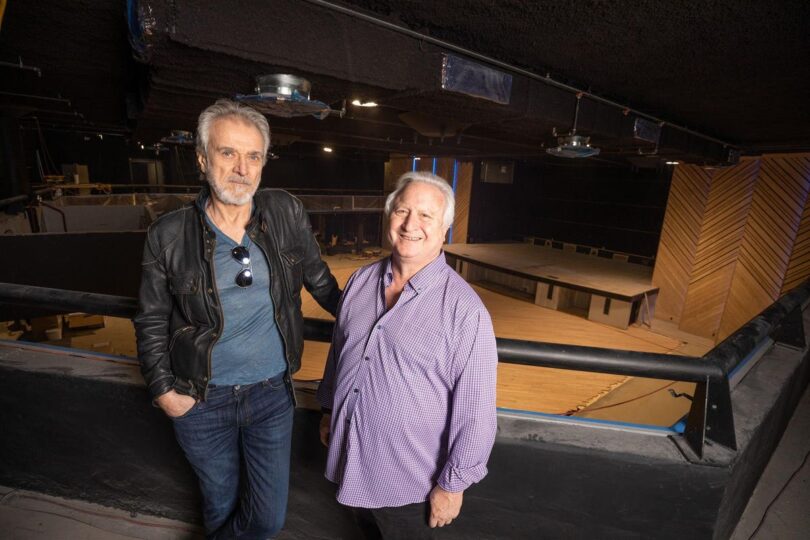Michael Swier (L) and Greg Perloff have teamed up for L.A.’s The Bellwether.
Since L.A.’s newest venue, The Bellwether, opened up July 11 with a sold-out show by duo Phantogram, the space has played host to some incredible gigs, highlighted by three sold-out HAIM shows, Carly Rae Jepsen, Tegan And Sara, three nights from Porter Robinson and more.
Everybody wants to play the hot new spot. But in the case of The Bellwether, the hype is well deserved. A gorgeous space that holds 1,600 in the main room and features enough side rooms — including a state of the art events space, a beautiful balcony, a restaurant dubbed the Virginian —to host a killer Halloween haunted house (Alice Cooper, Rob Zombie, you listening?), The Bellwether is a worthy addition to both the storied L.A. venue scene and the history of its address, 333 Boylston. That address once housed Prince’s Glam Slam in the Nineties, so if you are going to build a music venue where Prince once ruled, it better be good.
The Bellwether is indeed Prince worthy. He probably would have done after hours shows there. But for as much as L.A. is mocked for its shallowness and superficiality, the reality is the only way a venue is going to succeed in a city with so many acclaimed spaces already entrenched in the market, is to have the musical relationships and knowledge to compete. As someone who has been part of L.A music for a long time, I have seen many venues try and buy their way into the fabric of the city. And the only way you’re going to make it is if the industry trusts you.
That is where the team of Greg Perloff, from San Francisco-based promoter Another Planet (Outside Lands) and New Yorker Michael Swier (who helped launch New York mainstays Mercury Lounge and Bowery Ballroom, as well as L.A.’s Teragram Ballroom and Moroccan Lounge), come in. Their combined experience and respect on the industry is key to The Bellwether being set up for a long run in L.A. and not just another one-hit wonder.
I spoke with the pair backstage during the HAIM run about the new venue, the history there, their music stories and much more.
Steve Baltin: How’s it been going so far?
Greg Perloff: Fantastic.
Michael Swier: Excellent, it’s been a long road. Such a release of breath once it opened. I was like, “Whoa.”
Baltin: As you were watching everybody come in on the first night and the venue come to life with all these people take me through that feeling of watching people come in and see everything you’ve done.
Perloff: It’s funny because last night I didn’t realize this at Phantogram but last night I realized every single person who was in the venue it was their first time they’d been here. That never happens. But I think that the wow factor of when they walk in and there’s that yellow floor and the chandeliers and then they go through the doors and we have the latest in magnetometers and they work a lot faster than the old ones. So most people aren’t stopped because it knows what it’s doing. And so in the whole line of 500 people the beginning went in like that. And then when they got through the second doors into the where the blue floor is and the bar it was just like it is a first. As our age there are very few firsts. Like the first time you went to Disneyland, the first time you water-skied. And so in this case they’re getting to experience a first in a room and it was really exciting.
Baltin: You’re getting to watch the venue through the eyes of the people who are coming in for the first time. So have there been things that you’ve heard thus far from people either walking in or out or just as you’re watching people stand in the audience?
Swier: People are in awe. We’ve had tours here with the industry and others too just prior to the opening. So we get that when it happened then. And then same thing when people are coming in the first time, you could see it in their eyes. You don’t have to listen to what they’re saying. Their eyes tell the story. It opens up at the little by little and then you get into the big room and then you go exploring the patio. You go exploring the restaurant and everyone is in awe just walking around it. I’ve opened many rooms for the first time and there’s nothing like it. And this one is like the pinnacle of what I’ve done in my career as far as its size and the way it’s come out; the framing of the whole room, whether it’s the main stage how it fits in the centre room, the balcony around it and then all the ancillary stuff. It just unfolds.
Perloff: We have that first wow factor when you go in but then you go up the staircase into the room and you get a second wow factor and people say things like the sightlines are really good. Well, in this case 100 percent of the audience has great sightlines. The other thing that people said that no one’s ever been into a club that has beautiful marble walls in the bathrooms. The women coming out of the bathroom were just shaking their heads because you don’t usually get someone to say, “Wow, have you seen the bathroom?”
Baltin: Talk about the location.
Perloff: I grew up in L.A. and used to go to the Santa Monica Civic. Everything was on the west side and then suddenly Universal opened up. And that had people moving to a different area. And then what used to be called Staples and the whole downtown thing. Before my time I guess it was the Olympic Auditorium but there’s been movement in LA. So when we said we’re a block west of downtown people were scratching their heads. But one of the things that our general manager Casey Loudermilk has done is he’s made deals with all the parking lots and we have enough parking to park every single person within two blocks of here and almost everybody within one block. And that’s so exciting because we heard that parking was difficult but it’s not at all. And we made deals where I mean the closest lot right across the way is 10 bucks. Now we can’t guarantee other operators thing but that’s a pretty good price. So that’s been exciting for us that we actually got the parking lots because I hate lines. I don’t want lines at the bars. I want a lot of people going to march in the bars but I don’t want lines [laughter]. And so the funny part is we knew this would happen that the first time people come in, they rush to the bar right in the front. They didn’t know where the bars were. They didn’t know where the restaurant was. They didn’t know where the bathrooms were. And every night is a first, ’cause our programming is different. We have a broad range. You’re not going to have the same people every night. And we’re trying to cover every genre of music.
Swier: Yeah, we’ll be having first views for a couple years. I think people coming for the first time.
Baltin: I’m always curious as a fan who’s the dream artist, the one for each one of you that you would love to have in here?
Swier: I’d like to see Radiohead here..Hard to believe, but they played the Mercury Lounge many years ago [laughter]. There are The Strokes. I had The Strokes, The White Stripes were there at the Mercury. Arcade Fire was on the Mercury stage, all 12 or 13 of them. It’s always fun to see that. I think all of them took Madison Square Garden, and within a couple years. So having those people that were part of my world then that are big still. We can have Jack White. That’d be cool.
Perloff: Because so many musicians live in LA, we wanted them to know that if they wanted to come in and work something out, they could. We hope we’ll continue to do all these underplays. And people will say, “Hey, why don’t we get together and do blah, blah, blah at the Bellwether?” It’s not all about they’re on product. They’re trying to take advantage of being on product, but in between play here. We haven’t opened up the event space yet, but I think that’s going to be just huge for the musical community. The film studios next door are huge, LA Centre Studio. They were telling me about all the different things that could be used here, like the hallways for TV and film shoots. And we’re hoping that a lot of people will hold record release parties and all. But we’re not going to open it until the fall because we wanted to get the building dialed in. We knew we have a great sound system, I was telling somebody, yesterday, if a band’s on the road and any arena band or stadium band, they tour with the same sound system every night. Right? And there’s a great sound system, but there’s a difference between that and that same sound system, that great sound system tune to the room. We spent over three weeks making small adjustments to the sound system. So it’d be tuned to the room. And so that’s pretty exciting. We also are one of the few places that have a video screen, a full entire stage. So bands can come in and they don’t have to spend a fortune to rent a video screen.
Baltin: Last week, I happened to be talking to Robert Glasper, who I love. He said all these musicians moved from New York during the pandemic. And he said, there’s a great jazz scene here, but there hasn’t been a venue for it. Do you see, because there are so many different rooms in here, the possibility of doing jam sessions or creating that type of environment?
Perloff: Absolutely. Tell them about the event space here. There are certain bands, whether it’s HAIM or Taylor Swift or Robert Glasper, that artists who other people gravitate towards. Make him the artist in residence here and use that room as a laboratory. We want to do things like that.
Baltin: And who is your dream artist?
Perloff: Right now, I’d love to see Joni Mitchell here.
Swier: Wow, that’d be cool.
Perloff: We both mentioned a couple older artists, but for me it’s always Paul McCartney no matter what.
Baltin: Is there one transcendent show for you?
Swier: I was living in LA from ’74 to ’78 and Troubadour was having their twentieth anniversary. And I was living in the south in Hermosa Beach, I was just a kid. And I was at Jackson Browne, and he was playing a show at the twentieth anniversary. And I remember I just had a bicycle. I didn’t have a car. So I bicycle from Hermosa Beach to the Troubadour, there was this huge line. So I went to the second guy and my third guy in line, I go, “Are you gonna use all your tickets?” And he goes, “I only need one.” They were selling four. So I bought the three from him. But that show was spectacular.
Baltin: I get excited still when I see fans and their enthusiasm. So when you drive up to a venue and you see a line all the way around the building well before seven o’clock, it’s got to be exciting because you know that people inside want to be there.
Perloff: You have to understand neither Michael or I are booking this room. Our booking department they’re all in their 20s and 30s. It’s a young person’s sport. In a room this size, you’re dealing with a lot of people who are working off one or two records and are making it. It might be their third appearance from a 250 seater to a 500 seater to a 1,500 seater. And it’s not to say that we don’t have our hand in some things like Wilco or something like that but…
Swier: Yeah, we’re always in the youth. The Bowery Ballroom, Mercury Lounge, the independent other places, this is where the incubations are. So it’s always the young bands when you have that early stages of stuff. And then obviously when we do more traditional old things that have been around for a while like the Linda Ronstadt or the Joni Mitchell’s or the Jackson Browne’s. I think of Radiohead now being still young but they’ve been around forever.
Perloff: LCD has been around for 20 years. I remember Bill Graham, who I worked for. One day we were at a show and he says, “We age and the audience stays the same.”
Baltin: I imagine that even if the even if the booking is a young person’s game it still has your imprint on it. You guys both have your relationships and you’re able to sort of incorporate that in here.
Swier: Sure, for me even coming to LA in general, which happened in 2015 with Teragram, with the level of the industry being here, like in New York, there were two centers of industry and working within those agencies those agents and the histories and the relationships you grow with them, it’s similar and they all have offices in each market. So you’re kind of talking to them all the time on both coasts. So I felt comfortable coming into something like this because of that.
Perloff: We’ve been doing HAIM since day one. Some people just want to do, in particular in L.A., the latest “Copper penny,” the new shiny penny. That’s great as long as what your real goal is is to do quality artists. And that’s why you need different bookers who know how to book different types of acts. The thing we want to tell people and I think it’s obvious for our initial run of 40 shows is that we want to be open to experimentation. We want to be open to every type of music. We want to be open to comedy. We want to be open to Latin. We want to be open to whatever it is. Maybe someone wants to do experimental theater. There are no limitations. And the nice part about Michael and I being together is we don’t have corporate policies that dictate what we should do. We’re open to everything. Tt might turn out to be eGames or it might turn out to be some Samuel Beckett thing.








